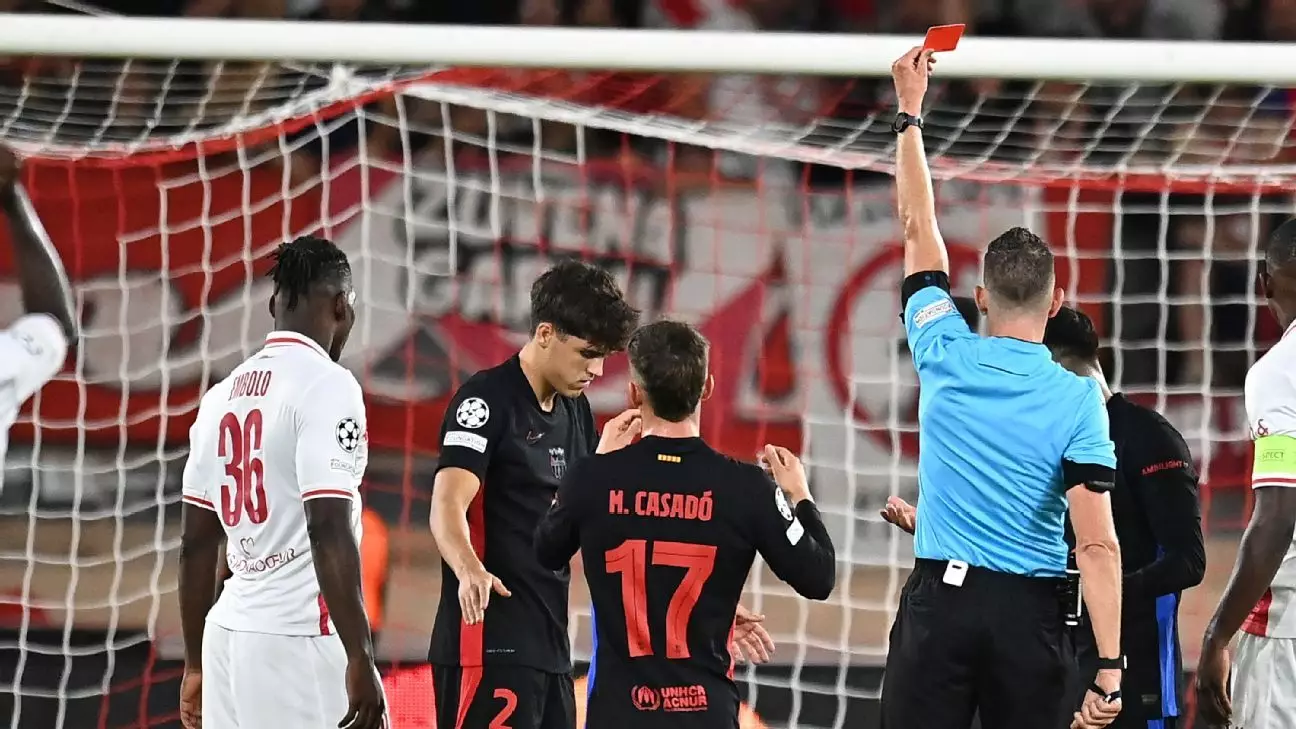In an unexpected twist, Barcelona recently faced a significant setback under the guidance of coach Hansi Flick, marked by a 2-1 defeat to AS Monaco that has raised eyebrows within the football community. The match, which saw Eric García receiving a red card merely ten minutes in, has been pinpointed as a crucial moment that altered the trajectory of the game. Flick expressed that this early dismissal completely transformed Barcelona’s match strategy. Playing with ten men against a fast-paced Monaco side proved to be a daunting challenge, and despite an early equalizer from Lamine Yamal, the Catalan giants were unable to secure a positive outcome.
Many pundits argue that early red cards can often overshadow the tactical approaches of a team, and in this instance, it certainly appeared to be the case. Barcelona’s initial game plan was tossed aside, forcing them into a more defensive posture, which limited their instinctive attacking style, characteristic of Flick’s training regimen.
As the match progressed, Barcelona’s defense became increasingly strained. Flick acknowledged the efforts made to maintain a compact defensive unit despite being a man down. “We defended with a lot of passion,” he stated in the post-match press briefing, highlighting the players’ commendable work ethic under strenuous circumstances. However, the reality was that Monaco capitalized on their numerical advantage and heightened pace, effectively exploiting the gaps in Barcelona’s formation.
Goalkeeper Marc-André ter Stegen pointed to a specific incident that catalyzed García’s red card, attributing it to a misunderstanding during play. He lamented the consequences of the decision, emphasizing the difficulty the team faced with one less player. He expressed dissatisfaction but also recognized that the squad’s spirit remained commendable, reflecting a true, albeit frustrating, competitive spirit.
Thus, while the efforts of the squad were commendable, the crux of the issue lies in the ability to maintain tactical discipline under pressure. Flick must now strive to cultivate resilience within the squad to better navigate similar scenarios in the future.
Despite the disappointment etched in the dressing room post-match, Flick showcased a stoic resolve, urging his players to lift their spirits and focus on upcoming fixtures. “Heads up,” he advised, insisting that this setback should be treated as a learning experience rather than a catalyst for despair. The performance, albeit marred by a loss, offered glimpses of potential, particularly in terms of teamwork and perseverance, elements that Flick is determined to foster.
As Barcelona prepares for their subsequent Champions League match against Young Boys, the coaching staff’s focus must pivot towards refining strategic approaches to avoid similar pitfalls. The goal of progression in a transformed Champions League format makes it imperative for Barcelona to analyze their weaknesses and rectify them swiftly.
One silver lining in the aftermath of the defeat was the return of young talent Ansu Fati, who made his first season appearance following injury. Flick acknowledged Fati’s positive transformation during training, indicating that his presence on the field adds significant value. The burgeoning forward’s journey back to form is paramount, not only for Barcelona’s Champions League ambitions but for sustaining the team’s overall dynamism.
Moreover, the emergence of Lamine Yamal continues to be a source of optimism. At just 17 years old, Yamal’s remarkable performance has placed him in the spotlight, establishing him as a key figure in Barcelona’s attacking lineup. Despite the pressure and challenges presented by opposing defenders, Flick’s decision to take Yamal off in the Monaco match highlights a strategic mindset focused on maintaining player longevity amidst a demanding fixture schedule.
The daunting task ahead for Flick involves preparing for crucial fixtures against formidable opponents such as Bayern Munich, Borussia Dortmund, and Benfica. Barcelona must not only seek redemption following the Monaco loss but also construct a foundation strong enough to challenge for honors in both domestic and European competitions.
While the defeat was unfortunate, it is essential for the squad and coaching staff to translate these challenges into learning opportunities. Barcelona’s rich history is built on resilience and the ability to adapt; thus, this recent defeat serves as a reminder of the unpredictable nature of football. With a focus on teamwork, strategy refinement, and player development, hopes remain high for Barcelona’s journey in this new Champions League format. As the season unfolds, cautious optimism coupled with tactical acumen may lead to a rediscovered strength that encapsulates the essence of Barcelona football.

